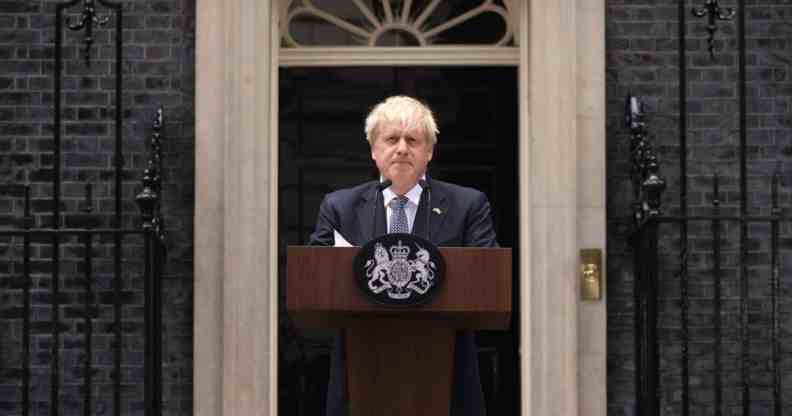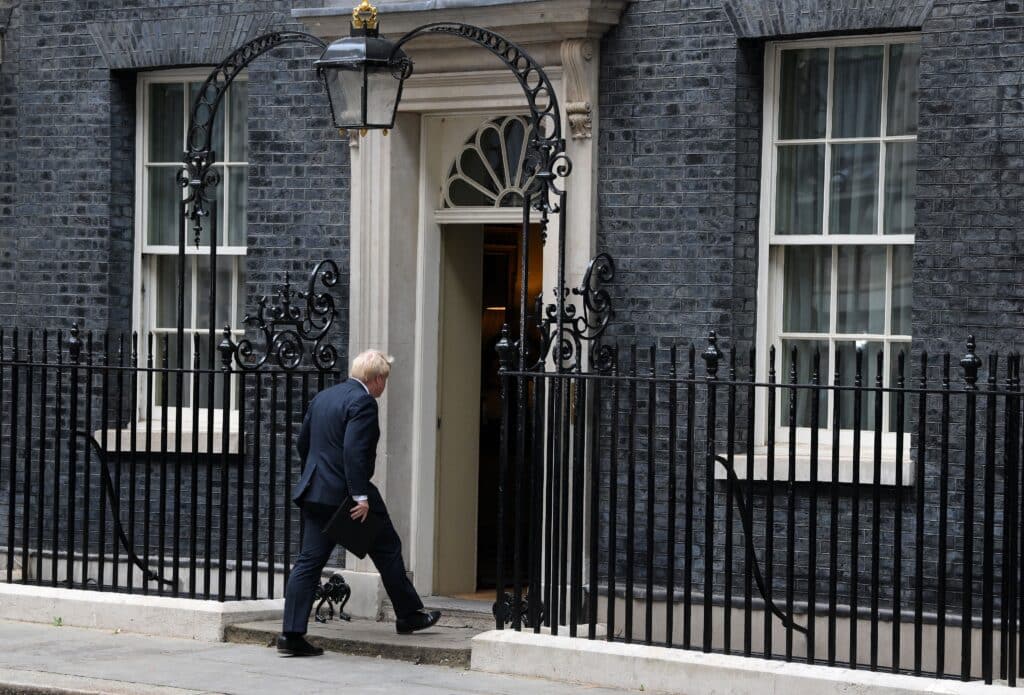Boris Johnson resigns as prime minister

Prime minister Boris Johnson has resigned. (Dan Kitwood/Getty Images)
Boris Johnson has resigned as leader of the Conservative Party and will step down as prime minister of Britain once a successor is chosen.
Johnson said the timetable for his departure and selection for the party’s new leader will be announced by a committee of senior Conservative MPs next Monday. A successor will likely be chosen by Autumn.
Standing outside Number 10 on Thursday afternoon (7 July), Johnson said: “It is clearly now the will of the party that there should be a new leader. The process of choosing a new leader should begin now.”
“I have appointed a Cabinet to serve until a new leader in place,” he added, “I want to say to the millions of people who voted for us in 2019: thank you for that incredible mandate, the biggest Tory majority since 1987.”
Amid boos and an occasional cheer, a still pugnacious Johnson said it was his “duty and obligation” to stay on in his role. But now was the time to step down.
I want to thank you, the British public, for the immense privilege of serving you as Prime Minister.
I want you to know that from now until my successor is in place, your interests will be served and the government of the country will be carried on.https://t.co/T4kJoxmZ8q pic.twitter.com/Hn4rDUV319
— Boris Johnson (@BorisJohnson) July 7, 2022
This was a “painful” decision, he said, “but when the herd moves on, it moves”.
“Our brilliant and Darwinian system will produce another leader,” he said, adding the next leader will have his full backing.
“And to you, the British public, I know there will be many people who will be relieved and perhaps quite a few who will also be disappointed and I want you to know how sad I am to be giving up the best job in the world. But them’s the breaks,” he said, thanking his wife Carrie Johnson and his family.
Reflecting on his own battle with COVID-19, he also thanked the NHS for “[extending] my own period in office” – a chorus of jeers followed.
“Above all, I want to thank you, the British public for the immense privilege that you have given me. I want you to know that from now on and until the new prime minister is in place, your interests will be served and the government of the country will be carried on,” he continued.
“Even if things can sometimes seem dark now our future, together, is golden,” Johnson concluded, stepping back into the office he has called home for the last three years.
Less than a dozen Tory MPs reportedly showed their support for the premier by showing up for the speech. They, of course, included culture secretary Nadine Dorries.
Johnson reportedly came to the decision Thursday morning after a final tranche of resignations, including those of newly-appointed education minister Michelle Donelan and security minister Damian Hinds. Newly-appointed chancellor Nadim Zahawi, while not quitting, also released a letter calling for Johnson to go.
On Wednesday, Johnson had been insistent that he would continue on despite more than 40 payroll resignations.

Boris Johnson walks back into 10 Downing Street. (DANIEL LEAL/AFP via Getty Images)
Boris Johnson survived Partygate and multiple other scandals, but in the end, it was his support for Chris Pincher that was the final nail in his coffin.
Pincher resigned as the party’s deputy chief whip after he was accused of groping two men. Other allegations have since surfaced against him, including incidents reported before Johnson appointed him as a whip.
Downing Street initially denied Johnson had any knowledge of the previous accusations of sexual misconduct against Pincher – until Johnson’s office admitted he did but promoted him regardless.
For many, including chancellor Rishi Sunak and health secretary Sajid Javid, this was the final straw. Their resignations, within minutes of one another, set the stage for a final reckoning.
The Conservative Party leader was once thought invincible. He survived disgraces seemingly no other leader would – the alcohol-soaked, lawbreaking lockdown parties in Downing Street, a fine from police, a failed no-confidence vote and his handling of a pandemic that resulted in hundreds of thousands of deaths.
But after more than two dozen disaffected government officials – including top Cabinet ministers – resigned, the knife was twisted.
Johnson knows well how such high-level resignations can be catalysts for the beginning of the end. He stepped down as foreign secretary in 2018, getting the ball rolling for then-prime minister Theresa May to face a no-confidence vote.
She survived by a larger margin than Johnson did but resigned shortly after.
Johnson’s government collapsing around him, he pushed through. He vowed to stay on as prime minister, as he told parliament on Wednesday: “The job of a prime minister in difficult circumstances when he’s been handed a colossal mandate, is to keep going.”
Hours later, a group of own cabinet ministers, including Nadhim Zahawi, marched into Downing Street to tell Johnson to resign. He resisted, but on Thursday morning apparently realised that resistance is futile, his government was left unable to function and his support base almost entirely evaporated.
Johnson’s party promised a lot to the LGBTQ+ community. A reformed Gender Recognition Act, a trans-inclusive conversion therapy bill and a conference to celebrate the global LGBTQ+ community.
None of this happened. The government scrapped the GRA reforms, refused to protect trans people from its already-delayed conversion therapy and cancelled the Safe to Be Me conference after more than 100 LGBTQ+ groups pulled out in opposition to Johnson.
The Tories have increasingly taken aim at trans rights in a way some LGBTQ+ community leaders see as Trumpian at best, with claims that trans women shouldn’t compete in sports and that gender-affirming healthcare for trans youth “borders on ideological“.
Britain was, after all, top of ILGA-Europe’s ranking of the most LGBTQ+ friendly nations in Europe in 2014.

